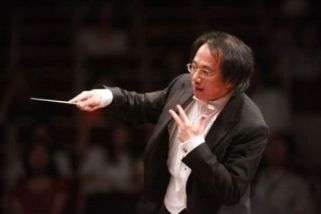|
Back
A generous finale to a European tour Berlin
Philharmonie
11/18/2013 -
Ming-Hsiu Yen: Breaking Through
Jean Sibelius: Violin Concerto in D minor, Op. 47
Christian Jost: Taipei Horizon
Antonín Dvorák: Symphony No. 8 in G major, Op. 88
Viviane Hagner (violin)
Taiwan Philharmonic (National Symphony Orchestra), Shao-Chia Lü (conductor) 
S.-C. Lü (© Huntz Yen)
The Taiwan Philharmonic (National Symphony Orchestra), under the direction of Music Director Shao-Chia Lü, wrapped up its first European tour since 1997 at Berlin’s Philharmonie.
The ambitious two-and-a-half hour plus program opened with a work for large orchestra, Breaking Through, by Taiwanese composer Ming-Hsiu Yen (born 1980). Commissioned by the Philharmonic to open its 2013 concert season, the approximately 14-minute piece depicts the tragic, but ultimately triumphant, saga of the construction between 1991 and 2006 of the 13-kilometer-long Hseuhshan (Snow Mountain) Tunnel, the longest road tunnel in East Asia. At times cacaphonic, haunting and peaceful, the programmatic work evoked a wide range of musical images - from The Rite of Spring to Coplandesque imagery of the American mid-west. Lü sustained a dramatic pulse with varying rhythms and colors throughout, particularly in the overly-long climax.
Munich-born Viviane Hagner then joined the orchestra for a performance of Sibelius’ Violin Concerto. As is now so often the case with violinists in many concerti, her performance was straightforward, technically adept and heartfelt, with hints of mystical qualities in the first movement. Ultimately, however, she failed to bore into the depths and intensity of this robust work. To aggravate matters, the orchestra kept showing off its strengths when playing alone—churning up deep, sweeping rhythms and big sounds with a burnished tone that was in stark contrast to Hagner’s more lyrical performance. She would have profited more if accompanied by a chamber orchestra. (Where is the Ida Haendel of our day ?)
The second half of the concert opened with Taipei Horizon by German composer Christian Jost (born 1963). Based on a two-month visit to Taipei, it purports to offer, according to the program notes, “a free meditation” on the city. Its dark, monotonous sonorities, however, couldn’t be further away from that vibrant, light-filled metropolis. The work evoked, rather, some of the large, darker compositions of Anselm Kiefer. A better title would have been “Meditation on the End of Civilization”. The program could easily have done without this work.
A felicitous performance of Dvorák’s Symphony No. 8 concluded the formal program. Again, conductor Lü consistently drew luscious sounds from all sections of the orchestra, each of which played with a single, unified voice. He brought a light, lyrical touch to the numerous melodies, and exhibited a sure hand in building up with sustained tension the climaxes to the first and fourth movements. The burnished sound from the brass (of the half dozen or so major orchestras in Berlin they would be second only to the brass section of the Berlin Philharmonic); the diaphanous dance rhythms from the strings; the flawless intonation from the woodwinds; and the tight, meticulous execution from the percussion proved beyond a doubt that the Taiwan Philharmonic is a first class orchestra.
Three encores rounded out the evening’s generous program, including a rousing Dvorák Slavonic Dance No. 5, and a traditional Chinese folk song tenderly performed by soprano Meng-Chun Lin.
Earl Arthur Love
|